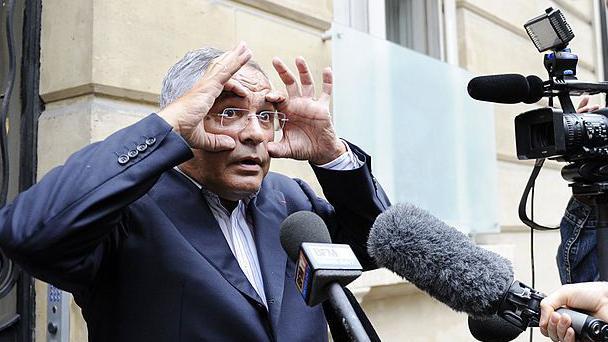It was January 1998 and Robert Bourgi was waiting for Gabonese President Omar Bongo in an antechamber of his seaside palace in Libreville.
He was there to raise money for the upcoming French presidential elections on behalf of the center-right Gaullist candidate Jacques Chirac, who was mayor of Paris at the time.
Who should be ushered into the same antechamber than Roland Dumas, the former French Foreign Minister and right-hand man of the ruling Socialist President François Mitterrand, Chirac’s arch-rival.
“Good day, Bourgi,” Dumas said. “I believe we are here for the same purpose.”
Dumas claimed seniority and entered Bongo’s office first. When he emerged a short time later, he told Bourgi, “Don’t worry, there’s still a little left!”
Told in Bourgi’s newly published memoirs They know that I know it all: my life in Françafriquethe anecdote says everything about the money theft and the mutual dependency that have linked French and African politics for so long.
For four decades, Robert Bourgi was at the center of it all.
Born in Senegal in 1945 to Lebanese Shiite parents, he grew up to be a confidant of a generation of African leaders – from Omar Bongo in Gabon to Denis Sassou Nguesso of the Republic of Congo and Blaise Compaoré of Burkina Faso.
And in Paris he inherited the mantle of the legendary Jacques Foccart – the Gaullist who oversaw the post-colonial Françafrique system, with its arrangements of influence and protection, markets, materials, muscles… and money.
From the early years after World War II – when Africa had been a center of activism in favor of post-war French leader Charles de Gaulle – Africa and its former French colonies had been a source of funding for all French political parties. When Bourgi came on the scene in the 1980s, it was routine.
Bourgi says he never imported the bags of cash himself.
“The procedure was simple. As elections approached, Chirac made it clear that I had to deliver a message in several African capitals,” he said in an interview in Le Figaro newspaper this week.
“The (African) heads of state then sent an envoy with a large amount of money to my office in Paris. Several millions in francs or dollars.”
In each of the 1995 and 2002 presidential elections – both won by Chirac – about $10 million was given by African leaders, he said.
The 2002 race provided another colorful story for Bourgi, when a representative of Burkinabe leader Blaise Compaoré arrived in Paris with a large sum of money hidden in djembe drums.
According to Bourgi, he accompanied the envoy to the Elysée Palace, where they were greeted by Chirac. They opened the sealed barrels with scissors, upon which a shower of banknotes fell.
“Typical Blaise,” Bourgi quotes Chirac. “He sent us small denominations.” The money was apparently all in fives and tens.
Handling cash wasn’t always easy. Bourgi recalls a large donation to Chirac from another African leader, saying: “The money arrived in Puma sports bags. I wanted to wrap the wads in paper, so I went into my daughter’s room, took one of her posters and wrapped the money in it.
The system was so widespread that it gave rise to a verb gift voucher – from the French gift, means a gift.
When Bourgi’s allegations first surfaced in 2011, they were denied by officials in Burkina Faso and elsewhere, although a former presidential adviser in Ivory Coast admitted they were “historic practices.”
Jacques Chirac and his then chief of staff Dominique de Villepin also strongly denied Bourgi’s claims.
A preliminary investigation was opened, but was later dropped without further action because the payments had been considered too long ago.
For African leaders at the time, Bourgi says, it was normal, and they did it among themselves. Giving large sums of money was a way to gain trust and support.
But in a changing world it was unsustainable and Bourgi says he became disillusioned. Nicolas Sarkozy came to power in 2007 promising not to take a single franc from Africa, and Bourgi says he has kept his word.
Sarkozy has since been investigated for allegedly taking campaign money from Libyan leader Muammar Gaddafi, which he denies. Bourgi, a Sarkozy loyalist, says he does not believe the accusations.
The former lawyer, now 79 years old, also reflects on his rather different role in another election – that of Emmanuel Macron in 2017. That was the moment when Bourgi helped reduce the chances of the man who was for a time the runaway favorite , the conservative François Fillon. .
Once close to Fillon, Bourgi had become estranged: he accused the former prime minister of being rude and stingy. So he announced to a journalist that he had given Fillon two very expensive suits as a gift.
Fillon campaigned on a message of honesty and never recovered from that. He was later convicted of giving his British wife a fake parliamentary job.
But Africa is Bourgi’s love.
He reflects that although the corruption at the heart of Françafrique was wrong, the system at the time brought stability and an often personal bond between French and African leaders.
Today that has disappeared.
France has a deteriorating image in its former colonies and its influence is waning. Witness the recent withdrawal from former army bases in Mali and Niger.
“I note with sadness the breakdown of French relations with the continent,” says Bourgi.
“But it is too easy to put all the blame on Françafrique… Africa is globalized. France has not been able to adapt to this new fact. And it always makes the same mistake: arrogance.”

